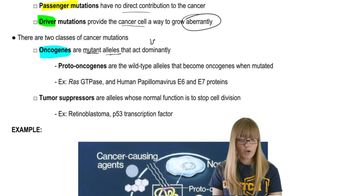Table of contents
- 1. Introduction to Genetics51m
- 2. Mendel's Laws of Inheritance3h 37m
- 3. Extensions to Mendelian Inheritance2h 41m
- 4. Genetic Mapping and Linkage2h 28m
- 5. Genetics of Bacteria and Viruses1h 21m
- 6. Chromosomal Variation1h 48m
- 7. DNA and Chromosome Structure56m
- 8. DNA Replication1h 10m
- 9. Mitosis and Meiosis1h 34m
- 10. Transcription1h 0m
- 11. Translation58m
- 12. Gene Regulation in Prokaryotes1h 19m
- 13. Gene Regulation in Eukaryotes44m
- 14. Genetic Control of Development44m
- 15. Genomes and Genomics1h 50m
- 16. Transposable Elements47m
- 17. Mutation, Repair, and Recombination1h 6m
- 18. Molecular Genetic Tools19m
- 19. Cancer Genetics29m
- 20. Quantitative Genetics1h 26m
- 21. Population Genetics50m
- 22. Evolutionary Genetics29m
17. Mutation, Repair, and Recombination
Types of Mutations
Problem 1a
Textbook Question
Textbook QuestionIdentify the normal functions of the following genes whose mutations are associated with the development of cancer.
c-MYC (Burkitt lymphoma)
 Verified Solution
Verified SolutionThis video solution was recommended by our tutors as helpful for the problem above
Video duration:
2mPlay a video:
Was this helpful?
Key Concepts
Here are the essential concepts you must grasp in order to answer the question correctly.
c-MYC Gene Function
The c-MYC gene is a proto-oncogene that encodes a transcription factor involved in cell cycle regulation, apoptosis, and cellular growth. It plays a crucial role in promoting cell proliferation and is essential for normal cellular functions. When mutated or overexpressed, c-MYC can lead to uncontrolled cell division, contributing to cancer development, such as in Burkitt lymphoma.
Recommended video:
Guided course

Functional Genomics
Proto-oncogenes and Oncogenes
Proto-oncogenes are normal genes that, when mutated or abnormally expressed, can become oncogenes, leading to cancer. They typically promote cell growth and division. Understanding the transition from proto-oncogene to oncogene is vital in cancer biology, as it highlights how genetic alterations can disrupt normal cellular processes and lead to malignancies.
Recommended video:
Guided course

Cancer Mutations
Burkitt Lymphoma
Burkitt lymphoma is a type of non-Hodgkin lymphoma characterized by the rapid growth of tumors, often associated with the c-MYC gene's translocation. This cancer is linked to the overexpression of c-MYC due to chromosomal rearrangements, which leads to increased cell proliferation. Recognizing the relationship between c-MYC mutations and Burkitt lymphoma is essential for understanding the genetic basis of this cancer.

 9:49m
9:49mWatch next
Master Point Mutations with a bite sized video explanation from Kylia Goodner
Start learning



